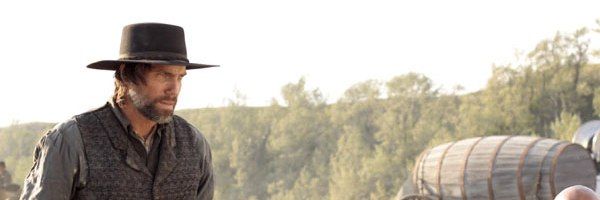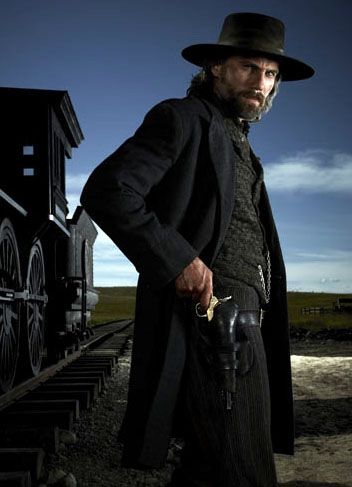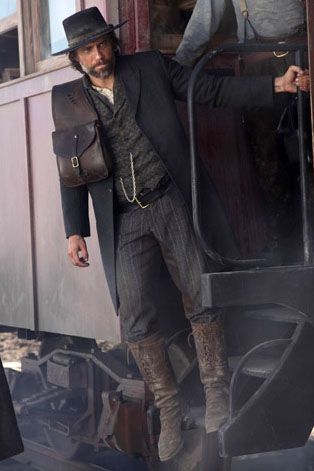On the new AMC Western series Hell on Wheels, actor Anson Mount plays Cullen Bohannon, a former soldier hell bent on avenging his wife’s death. Cullen starts out as a fractured and broken man, as a result of the rape and murder of his wife and the loss of his homeland, but soon becomes torn between the cycle of revenge he has unleashed and wanting to end all of the violence.
During a recent interview, Anson Mount talked about creating a character with morals and values from the past, the joy of playing such a bad-ass, and how much fun it is to live out childhood fantasies of playing cowboys and Indians. He also talked about the decision he made three years ago to change the career path that he was on, that he’d love to work with David Lynch, and how he’d like to put on 35 pounds and play The Doors frontman Jim Morrison in the last week of his life. Check out what he had to say after the jump:
Question: When you’re creating a character with morals and values from the past, how challenging is that?
ANSON MOUNT: Well, it’s hard to imagine. Growing up in the time that we’re growing up in, in the rich country we live in, it’s hard to imagine coming from a conquered nation. That’s what I have to re-imagine. That’s what I have to create. It’s this sense of coming from a place where martial law has been instituted in your home, and feeling like you don’t have a home anymore. I think that a lot of people are in the same boat. Common’s character is in the same boat, but for totally different reasons. Then Lily’s world gets blown apart, and she feels like that. That’s what puts us on the same plate, but for entirely different reasons. I would say that it is difficult to re-imagine the situation, the morals and the aesthetics, and the political bents of people from that time, but it’s the homework.
What’s it like to play such a serious character?
MOUNT: My friends laugh at me when they see this. I’m a goofball. I have my poker game with my buddies. I like science fiction. I took all the accelerated classes in school. I’m kind of a dork. I don’t know how to put on any tough guy pretensions. I’ve gotten my ass beat down in a bar fight before. I’m not a tough guy, but I’ve studied a lot of [Clint] Eastwood for this role. That’s the joy of acting. I could never be this bad-ass, in real life. I would never want to be that bad-ass. I’d probably be dead or in jail.
When you’re doing a period piece, how much do the costumes and props put you into that place?
MOUNT: A tremendous amount. Wendy Partridge is our costume designer and all of our costumes come from her warehouse. It’s not just the western genre that she knows, but specifically the 1860s. They’re different than what is romantically understood, in the past. For most of the boots, the heels were a little bit higher and they were outside the pants. Men wore their wool suit jackets when they were working. People routinely wore a belt and suspenders. You never see this stuff, and she’s gone back into the old photographs and worked to replicate the specific styles of that time. It’s the same thing with the props guys. When the visiting directors come out and walk around the set, their jaw is on the floor because there’s so much to use, they don’t even know where to begin.
Your character’s introduction in the show is pretty bad-ass. Have you had any classic style gunfights or high noon stand-offs yet?
MOUNT: You know, I did a movie with Lawrence Bender, called Safe, that was actually my first experience going into a choreography room to do a protracted fight scene with guns. That was awesome. It gave me an opportunity to get some of those training wheels under me, before I got back to the set for Hell on Wheels. The Griswold is a heavy gun. You can’t be doing quick whiplashes to the backs of people’s necks. It’s like a brick.
Can you do a quick-draw?
MOUNT: I’m not sure anybody can do a quick-draw with a Griswold. I’m serious. It is a big piece of metal. No, I haven’t trained doing any quick-draw stuff. We’re getting away from anything romantic in a western. There are definitely plot devices that you have to employ when you’re doing a television show, but you’re not going to see the good guy in a white hat and the bad guy in a black hat, standing on opposite ends. It’s not that kind of show. It’s going to be a lot more realistic and nuanced.
We learn a lot about Bohanan in the pilot. Is all of that as it appears to be, or will you be producing different colors throughout the season?
MOUNT: Oh man, that’s a huge question. I’m not going to answer the first part. In terms of introducing different colors, I’m learning as I go. I’m finding out new things with every episode, that I can incorporate that into what I’m doing. The writers are also figuring it out. There are things that change, and there are new ideas that happen during the season. I’ll leave it at that.
Westerns used to be a staple of primetime, and a lot of kids used to want to grow up to become Wyatt Earp or Cheyenne, or any number of Western heroes. How much fun has it been to live out those childhood fantasies?
MOUNT: When I was doing the pilot, I’d have flashbacks to the time I would climb this half-blown-over tree in my backyard, with a cowboy hat and a sheriff’s badge, and a little plastic six-shooter around my hip. I’ve been playing cowboys and Indians since I was six years old. About three years ago, I wanted to make a change in some of the things I was doing, and I said, “Okay, I want to do a Western. I’ll just put it out there.” I kept saying it, and here I am. There are days that I spend on a horse, out in the sun, getting to shoot a grizzly, and I can’t believe that I’m not having to pay them to do this. It’s amazing!
Do you think projects like this help settle the Civil War, or prolong the fascination with it?
MOUNT: I think that never-ending cultural war is part of who we are. I’m glad to be from a place that has its own cultural and social identity. Sometimes I don’t always agree with it, and sometimes I’m very proud of it. Like Durant says in the show, the peace between north and south can only happen through the binding of east and west. I think it’s great to be from a place that still has its own identity, to a certain degree. Not everybody is fighting the Civil War. Not everybody really cares that much. Particularly where I’m from, I think people are getting along. I’m proud to be from the south, warts and all.
What can you do in the Western genre on television, with a long-running series, that you can’t do in a feature, and what are some of the things that are part of the great Western features that you are not going to be able to do on television?
MOUNT: Tonally, we are getting to go a lot farther. The network is really letting us get away with a lot more than I thought. We are taking some risks and doing some stuff that I did not think, even on cable TV, we really would be able to push the boundaries on. But, there hasn’t really been too much difference from what you see in features, and what we are getting away with here.
From the point of view of an actor, is it very freeing and liberating, or is it actually a lot of extra work, to immerse yourself in this totally unusual world, in this place and time?
MOUNT: It’s both. I’m from the rural South. The accents have changed. The way of speaking has changed. Manners have changed. If you get an old almanac, you can look at how even weather prediction has changed. There is a tremendous amount of freedom, and there is a tremendous amount of source material, but we are limited. We are working very, very hard. Some research happened between the pilot and the following episodes. The Stephen Ambrose novel is my bible, in terms of this particular endeavor. I’ve enjoyed both the opportunity to research and take it off of my shoulders of invention so much and just look at what else can I glean.
Is there a role you’ve always wanted to play?
MOUNT: There are several roles that I’ve always wanted to play. Right now, I’d like to put on about 35 pounds and play Jim Morrison, in the last week of his life. I want the whole movie to take place in that last week.
Do you sing?
MOUNT: A little bit. Mostly people pay me not to sing, but I could learn. There are many, many roles in the theater that I want to play. With screenplays, it’s heartbreaking because some of the best ones just don’t get made. You’ll see amazing screenplays come in, but Alexander Payne’s project just got put on the back-burner because they couldn’t come to a budget agreement, and that’s just heartbreaking. It’s a beautiful script, called Nebraska. So, in film, there tends to be more people that I want to work with because I trust their work. I’d kill to work with David Lynch.
You said that three years ago, you decided to make some changes in what you were doing. What were the changes you wanted to make in your career?
MOUNT: Well, I just found myself living in Los Angeles for six years and working consistently, but doing the jobs that the machine wanted me to do. I don’t want to be in my late 30s, dying my hair and trying to be the best-looking guy in the room anymore. I’m sick of that shit. I was like, “I want to go back to New York and do some theater and get ugly again.” So, I stopped grooming myself so much. I moved back to my apartment. If you’ve ever tried to move from L.A. back to New York, that’s a pretty hard move. You forget how cramped things are in New York. You forget how dirty it is in New York. But, it’s been the best move of my life, not necessarily for my career, but for my soul. I was happier and I was back to doing theater, and things started taking off in a completely different way. I started playing bad guys. I started playing the roles that I was interested in. I didn’t want to be the good-looking guy in the office that the girl should be with, or the good-looking guy in the office that she shouldn’t be with. It’s just boring. I was hating what I was doing, so I decided to do what I wanted to do.



